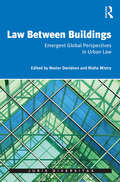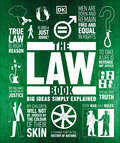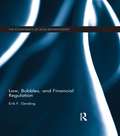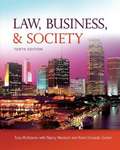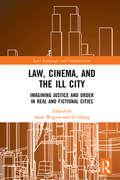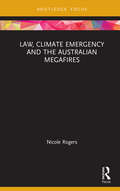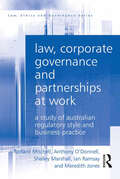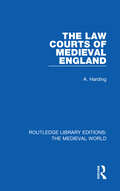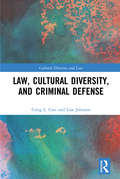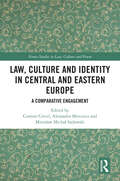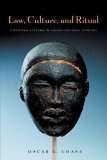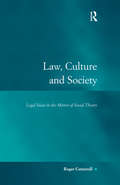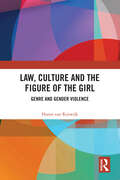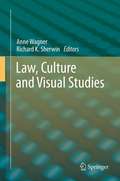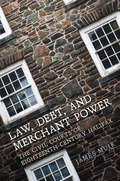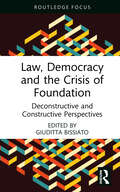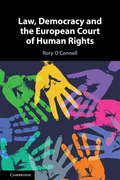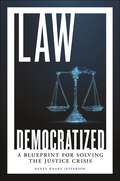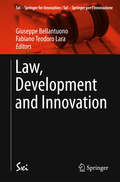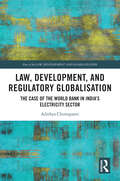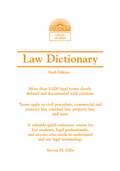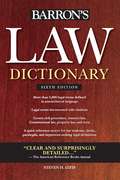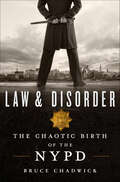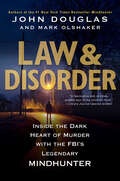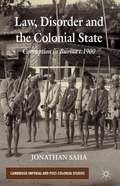- Table View
- List View
Law Between Buildings: Emergent Global Perspectives in Urban Law (Juris Diversitas)
by Nestor Davidson Nisha MistryThe rich field of urban law has thus far lacked a holistic and concerted scholarly focus on comparative and global perspectives. This work offers new inroads into the global and comparative streams within urban law by presenting emerging frameworks and approaches to topics ranging from urban housing and land use to legal informality and consumer financial protection. The volume brings together a group of international urban legal scholars to highlight emergent global, interdisciplinary perspectives within the field of urban law, particularly as they have import for comparative legal analysis. The book presents a timely addition to the literature given the urgent legal issues that continue to surface in an age of rapid urbanization and globalization.
The Law Book (DK Big Ideas)
by DKLearn about the most important legal milestones in history in The Law Book.Part of the fascinating Big Ideas series, this book tackles tricky topics and themes in a simple and easy to follow format. Learn about Law in this overview guide to the subject, great for novices looking to find out more and experts wishing to refresh their knowledge alike! The Law Book brings a fresh and vibrant take on the topic through eye-catching graphics and diagrams to immerse yourself in. This captivating book will broaden your understanding of Law, with:- More than 90 ground-breaking legal milestones- Packed with facts, charts, timelines and graphs to help explain core concepts- A visual approach to big subjects with striking illustrations and graphics throughout- Easy to follow text makes topics accessible for people at any level of understandingThe Law Book is a captivating introduction to the legal precedents, and religious, political, and moral codes that have shaped the world we live in, aimed at adults with an interest in the subject and students wanting to gain more of an overview. Discover the most important milestones in legal history, from the Code of Hammurabi to groundbreaking legislation including Magna Carta and the Abolition of the Slave Trade Act, all through exciting text and bold graphics.Your Law Questions, Simply ExplainedThis engaging overview goes into legal history across the world, all the way into the 21st century, with copyright in the digital age, same-sex marriage, and the &“right to be forgotten&”. If you thought it was difficult to learn about legislations and legal history, The Law Book presents key information in an easy to follow layout. Learn about the most important breakthroughs, like the fight for universal suffrage and workers&’ rights, and the establishment of international legal bodies like INTERPOL and the European Court of Justice.The Big Ideas SeriesWith millions of copies sold worldwide, The Law Book is part of the award-winning Big Ideas series from DK. The series uses striking graphics along with engaging writing, making big topics easy to understand.
Law, Bubbles, and Financial Regulation: Law, Bubbles, And Financial Regulation (The Economics of Legal Relationships)
by Erik GerdingFinancial regulation can fail when it is needed the most. The dynamics of asset price bubbles weaken financial regulation just as financial markets begin to overheat and the risk of crisis spikes. At the same time, the failure of financial regulations adds further fuel to a bubble. This book examines the interaction of bubbles and financial regulation. It explores the ways in which bubbles lead to the failure of financial regulation by outlining five dynamics, which it collectively labels the "Regulatory Instability Hypothesis." . The book concludes by outlining approaches to make financial regulation more resilient to these dynamics that undermine law.
Law, Business and Society (Tenth Edition)
by Tony McadamsDon't Just Learn the Law, Learn the Law in Context! In the tenth edition of Law, Business, and Society, Tony McAdams discusses the role of the market, ethics/social responsibility, and the law in regulating the complex relationship between business and the larger society. McAdams examines whether the market and ethics/social responsibility have failed, and if government intervention is needed to maintain a healthy relationship between business practice and society's general welfare. The text serves as a general introduction to the legal system, including chapters on constitutional law, the common law of contracts and torts, and employment law. The closely written narrative, edited law cases, contemporary vignettes from daily life and an abundance of thought-provoking questions help convey key points. In addition, Law, Business, and Society precisely conforms to AACSB International accreditation expectations.
Law, Cinema, and the Ill City: Imagining Justice and Order in Real and Fictional Cities (Law, Language and Communication)
by Anne Wagner Le ChengThis book uses film and television as a resource for addressing the social and legal ills of the city. It presents a range of approaches to view the ill city through cinematic and televisual characterization in urban frameworks, political contexts, and cultural settings. Each chapter deconstructs the meaning of urban space as public space while critically generating a focus on order and justice, exploring issues such as state disorder, lawlessness, and revenge. The approach presents a careful balance between theory and application. The original and novel ideas presented in this book will be essential reading for those interested in the presentation of law and place in cultural texts such as film.
Law, Climate Emergency and the Australian Megafires
by Nicole RogersThis book addresses the ways in which the Black Summer megafires influenced the development of climate narratives throughout 2020. It analyses the global pandemic, and its ensuing restrictions, as a countervailing force in the production of such narratives. Lives and properties were lost in the spring and summer of 2019 and 2020, when catastrophic bushfires burnt through millions of hectares of mainland Australia. Nearly three billion native animals died. And for millions of Australians, and others worldwide, it was through the Australian megafires that the global climate emergency became tangible, concrete, no longer a comfortably deferred, albeit problematic abstraction which could be consigned to future generations to deal with. This book explores the legal and other implications of new understandings of climate emergency arising from the fires, and the emergence of a hierarchy of emergencies as the pandemic came to dominate global and domestic political discourses. It examines narratives of culpability, and legal avenues for seeking retribution from government and big fossil fuel emitters. It also considers the impact of the fires on the burgeoning phenomenon of climate activism, particularly in Australia, and the ways in which pandemic restrictions curtailed such activism. Finally, the book reflects on the fires through the lenses offered by climate fiction, and apocalyptic fiction more generally, in order to consider how these shape, and might shape, our responses to them. This important and timely book will appeal to environmental lawyers and socio-legal theorists; as well as other scholars and activists with interests in climate change and its impact. It is recommended for anyone concerned about current and future climate disasters, and the shortcomings in legal, political and popular responses to the climate crisis.
Law, Corporate Governance and Partnerships at Work: A Study of Australian Regulatory Style and Business Practice (Law, Ethics and Governance)
by Shelley Marshall Richard Mitchell Meredith Jones Anthony O'Donnell Ian RamsayThis book examines how businesses manage their labour systems, and particularly how they manage the complex interaction of factors which give rise to instances of 'partnership' style relations between businesses and their employees. The book draws from the literature concerning 'Varieties of Capitalism' (VoC) and the different institutional and regulatory designs inherent in different types of political economy. The book is informed by a new and extensive set of empirical data from Australia that examines the activities of national and multinational business corporations, their outlooks and relationships with stakeholders, and relates these to new and evolving theoretical frameworks based in political economy and law. The book places the Australian regulatory model within this international debate, and assesses the extent to which the system does or does not fit into the general categorisation created in the VoC literature.
The Law Courts of Medieval England (Routledge Library Editions: The Medieval World #18)
by A. HardingOriginally published in 1973 The Law Courts of Medieval England looks at law courts as the most developed institutions existing in the medieval times. Communities crystallized upon them and the governments worked through them. This book describes the scope and procedures of the different courts, appointment of the judges, the beginnings of civil and criminal courts, the origin of the jury system and other aspects of the modern legal system. It is all shown by an analysis of actual reports of court cases of the time, giving a vivid picture of the life of the English people as well as of the ways of the professional lawyers, no less intricate than they are today.
Law, Cultural Diversity, and Criminal Defense (Cultural Diversity and Law)
by Craig L. Carr Lisa JohnsonAmerican legal scholars have debated for some time the need for a cultural defense in criminal proceedings where minority cultural information seems perti nent to a finding of criminal responsibility in situations where a minority cultural defendant has violated a valid criminal statute. This work presents a systematic analysis of this issue. Drawing from sociological, anthropological, and philosophical materials, as well as traditional legal discussions, the authors develop a scheme that indicates when cultural factors can be used as the basis for such a defense and when they are irrelevant to a finding of criminal responsibility. The argument moves from general concerns of social justice that apply under conditions of social and cultural pluralism to practical policy recommendations for the operation of American criminal justice. It thus connects more theoretical materials with the practical concerns of jurisprudence. The justification for legal recognition of a cultural defense in American criminal law is anchored firmly in American constitutional law.
Law, Culture and Identity in Central and Eastern Europe: A Comparative Engagement (Nomos Studies in Law, Culture and Power)
by Cosmin Cercel, Alexandra Mercescu and Mirosław Michał SadowskiMirosław Michał Sadowski is Lecturer at the University of Strathclyde in Glasgow, Scotland; Affiliated Researcher at the Centre for Global Studies, Alberta University in Lisbon, Portugal; Postdoctoral Researcher at CEBRAP – Brazilian Center of Analysis and Planning in São Paulo, Brazil; Research Assistant at the Institute of Legal Sciences, Polish Academy of Sciences in Warsaw, Poland.
Law, Culture, and Ritual: Disputing Systems in Cross-Cultural Context
by Oscar G ChaseDisputing systems are products of the societies in which they operate—they originate and mutate in response to disputes that are particular to specific social, cultural, and political contexts. Disputing procedures, therefore, are an important medium through which fundamental beliefs, values, and symbols of culture are communicated, preserved, and sometimes altered. In Law, Culture, and Ritual, Oscar G. Chase uses interdisciplinary scholarship to examine the cultural contexts of legal institutions, and presents several case studies to demonstrate that the processes used for resolving disputes have a cultural origin and impact.Ranging from the dispute resolution practices of the Azande, a technologically simple, small-scale African society, to the rise of discretionary authority in civil litigation in America, Chase challenges the claims of some scholars that official dispute systems are more reflective of the interests and preferences of elite professionals than of the cultures in which they are embedded.
Law, Culture and Society: Legal Ideas in the Mirror of Social Theory (Law, Justice And Power Ser.)
by Roger CotterrellThis book presents a distinctive approach to the study of law in society, focusing on the sociological interpretation of legal ideas. It surveys the development of connections between legal studies and social theory and locates its approach in relation to sociolegal studies on the one hand and legal philosophy on the other. It is suggested that the concept of law must be re-considered. Law has to be seen today not just as the law of the nation state, or international law that links nation states, but also as transnational law in many forms. A legal pluralist approach is not just a matter of redefining law in legal theory; it also recognizes that law's authority comes from a plurality of diverse, sometimes conflicting, social sources. The book suggests that the social environment in which law operates must also be rethought, with many implications for comparative legal studies. The nature and boundaries of culture become important problems, while the concept of multiculturalism points to the cultural diversity of populations and to problems of fragmentation, or perhaps to new kinds of unity of the social. Theories of globalization raise a host of issues about the integrity of societies and about the need to understand social networks and forces that extend beyond the political societies of nation states. Through a range of specific studies, closely interrelated and building on each other, the book seeks to integrate the sociology of law with other kinds of legal analysis and engages directly with current juristic debates in legal theory and comparative law.
Law, Culture and the Figure of the Girl: Genre and Gender Violence
by Honni van RijswijkThis book argues for the critical potential of locating the girl as the subject-position and voice of legal critique.Law’s imaginary is notoriously limited in its ways of thinking through and adjudicating gender violence. This book argues that ‘the girl’ is a key figure through which to understand, theorise, and challenge law’s relation to this violence. Law, Culture and the Figure of the Girl explains the meaning and significance of the figure of the girl to legal, political, and critical projects centred on trauma and responsibility. The book offers new readings of exemplary cultural texts that thematically deal with law’s adjudication of violence against girls, emphasising the ways these texts challenge dominant ways of thinking and doing law, jurisdiction, violence, race, and gender. The book also explores radical cultural figurations of the girl in fiction, films, and TV series and demonstrates the critical potential of these works in understanding and providing counter-narratives to dominant legal and cultural imaginaries. These works provide ways not only to critique existing law but to theorise emergent forms of law-making.This book will be of interest to scholars in the areas of cultural legal studies, law and literature, feminist legal studies, and cultural studies. It will also be suitable as a prescribed text for upper undergraduate classes and graduate studies in the disciplines of law, legal studies, cultural studies, and criminology.
Law, Culture and Visual Studies
by Anne Wagner Richard K. SherwinThe proposed volumes are aimed at a multidisciplinary audience and seek to fill the gap between law, semiotics and visuality providing a comprehensive theoretical and analytical overview of legal visual semiotics. They seek to promote an interdisciplinary debate from law, semiotics and visuality bringing together the cumulative research traditions of these related areas as a prelude to identifying fertile avenues for research going forward. Advance Praise for Law, Culture and Visual Studies This diverse and exhilarating collection of essays explores the many facets both historical and contemporary of visual culture in the law. It opens a window onto the substantive, jurisdictional, disciplinary and methodological diversity of current research. It is a cornucopia of materials that will enliven legal studies for those new to the field as well as for established scholars. It is a 'must read' that will leave you wondering about the validity of the long held obsession that reduces the law and legal studies to little more than a preoccupation with the word. Leslie J Moran Professor of Law, Birkbeck College, University of London Law, Culture & Visual Studies is a treasure trove of insights on the entwined roles of legality and visuality. From multiple interdisciplinary perspectives by scholars from around the world, these pieces reflect the fullness and complexities of our visual encounters with law and culture. From pictures to places to postage stamps, from forensics to film to folklore, this anthology is an exciting journey through the fertile field of law and visual culture as well as a testament that the field has come of age. Naomi Mezey, Professor of Law, Georgetown University Law Center, Washington, D.C., USA This highly interdisciplinary reference work brings together diverse fields including cultural studies, communication theory, rhetoric, law and film studies, legal and social history, visual and legal theory, in order to document the various historical, cultural, representational and theoretical links that bind together law and the visual. This book offers a breath-taking range of resources from both well-established and newer scholars who together cover the field of law's representation in, interrogation of, and dialogue with forms of visual rhetoric, practice, and discourse. Taken together this scholarship presents state of the art research into an important and developing dimension of contemporary legal and cultural inquiry. Above all, Law Culture and Visual Studies lays the groundwork for rethinking the nature of law in our densely visual culture: How are legal meanings produced, encoded, distributed, and decoded? What critical and hermeneutic skills, new or old, familiar or unfamiliar, will be needed? Topical, diverse, and enlivening, Law Culture and Visual Studies is a vital research tool and an urgent invitation to further critical thinking in the areas so well laid out in this collection. Desmond Manderson, Future Fellow, ANU College of Law / Research School of Humanities & the Arts, Australian National University, Australia
Law, Debt, and Merchant Power: The Civil Courts of 18th Century Halifax
by The Osgoode Society James MuirIn the early history of Halifax (1749-1766), debt litigation was extremely common. People from all classes frequently used litigation and its use in private matters was higher than almost all places in the British Empire in the 18th century. In Law, Debt, and Merchant Power, James Muir offers an extensive analysis of the civil cases of the time as well as the reasons behind their frequency. Muir's lively and detailed account of the individuals involved in litigation reveals a paradoxical society where debtors were also debt-collectors. Law, Debt, and Merchant Power demonstrates how important the law was for people in their business affairs and how they shaped it for their own ends.
Law, Democracy and the Crisis of Foundation: Deconstructive and Constructive Perspectives (Law and Politics)
by Giuditta BissiatoThis book addresses the crisis of the juridical-political foundation within contemporary democracies.Although modernity is the age of foundation, it is marked by what Carl Schmitt referred to as a peculiar ‘dialectic of presence and absence’ – and this is true even for those theories that seem to be the greatest supporters of the necessity of some kind of foundation, such as the Hobbesian commonwealth. This instability of foundation is inherent in the concept of ‘political representation’, which brings into being an idea – such as that of ‘nation’, ‘people’ or ‘popular will’ – which cannot, however, actually correspond to any empirical reality. Is it possible, then, to identify an absolute, certain and stable foundation capable of generating and guaranteeing the persistence of a legal and political structure? Or does this very question bind us to the history of an impossibility: a foundational absence, or void, whose presence is only now being strongly felt? Engaging both historical and contemporary perspectives, this book addresses the problem of foundation through both deconstructive and constructive perspectives – which respectively aim to challenge the very idea of foundation, or to overcome its contemporary crisis in order to present new, post-foundational possibilities.This book will be of interest to scholars and researchers working in the areas of legal and political theory.
Law, Democracy and the European Court of Human Rights
by Rory O'ConnellLaw, Democracy and the European Court of Human Rights examines the political rights jurisprudence of the European Court of Human Rights. It discusses how the Court supports a liberal representative and substantive model of democracy, and outlines the potential for the Court to interpret the Convention so as to support more deliberative, participatory and inclusive democratic practices. The book commences with an overview of different theories of democracy and then discusses the origins of the Council of Europe and the Convention and presents the basic principles on the interpretation and application of the Convention. Subsequent chapters explore issues around free expression, free assembly and association, the scope of the electoral rights, the right to vote, the right to run for election and issues about electoral systems. Issues discussed include rights relating to referendums, voting rights for prisoners and non-nationals, trade union rights and freedom of information.
Law Democratized: A Blueprint for Solving the Justice Crisis
by Renee Knake JeffersonA practical plan for providing legal help to all, regardless of resourcesMillions of people in the United States face legal problems without lawyers to help them. Why? How do we educate and inform the public about the law so they can understand when the services of a lawyer are necessary or desirable? When can individuals solve legal problems on their own or with the assistance of a specialist without a traditional law degree? In short, how do we democratize the law?Law Democratized offers a blueprint to increase legal help for everyone, regardless of their ability to pay. Building on more than a decade of research into innovation in legal services, the book advances a series of recommendations inspired by success stories from around the globe. Renee Knake Jefferson outlines different paths pursued by bar associations, courts, entrepreneurs, law schools, nonprofits, and others, evaluating the promise and pitfalls of each. She analyzes regulatory reforms employed in other nations, along with emerging efforts in a handful of US states.If the rule of law is the bedrock that American democracy rests upon, then the justice transformed system must be open and user-friendly to all. Law Democratized makes a compelling argument for transforming the American legal landscape through engaged citizenship, ethical innovation, expanded education, and regulatory reform, in order to democratize law and make legal help more accessible.
Law, Development and Innovation
by Giuseppe Bellantuono Fabiano Teodoro LaraThis book deals with one strand of the intense debate concerning the links between law and development, namely the coordination of innovation processes and legal change. It analyzes how innovation, and ultimately development, can be fostered or hindered by existing or new legal infrastructures. The book includes eleven original contributions from senior and junior scholars and is divided into two parts, the first focusing on theoretical frameworks and the second presenting several case studies on various institutional aspects. A particular strength of this part is its broad geographical coverage, which encompasses the legal frameworks in Europe, the Americas, Africa, and Asia. The contributions collected in this book will be of value to a broad readership. Academic scholars will find useful information on lessons learned from reforms implemented in different areas and come to better understand the methodological hurdles involved in reform assessment. Policymakers in national and international organizations can draw on these studies when designing new programs. Lastly, practitioners in developed and developing countries can use these contributions to promote the success of current or new initiatives.
Law, Development and Regulatory Globalisation: The Case of the World Bank in India's Electricity Sector (Law, Development and Globalization)
by Adithya ChintapantiExploring the phenomenon of diffusion of legal norms accompanying economic globalisation in developing countries, this book examines the blanket imposition of standard regulatory templates, maintaining that every jurisdiction requires customised legal solutions. Adopted by over 80 developing jurisdictions, the World Bank’s 1993 regulatory template for electricity sector reform has been one of the most widely diffused regulatory models. This book uses the example of its implementation in India to address the more general process of regulatory globalisation for developing countries. Amongst other objectives, the World Bank’s template endeavoured to insulate economic decision making from politics through legal reform. Through this template, the World Bank endeavoured to transform the role of the Indian state in the electricity sector from an interventionist or welfare state to a neo-liberal regulatory state by imposing constitution-like obligations. The book demonstrates that the unique social, economic and political characteristics of a jurisdiction cannot be ignored when incorporating a regulatory template in a jurisdictional context; for, by influencing the way an external regulatory model is internalized, it is these characteristics that determine its outcome. Providing a detailed empirical analysis of this key aspect of development policy, this book will be of interest to scholars and students in the fields of law and development, politics and public administration; as well as development practitioners and policy makers involved in reforming sector regulatory frameworks in their countries.
Law Dictionary, (Mass Market) 6th Ed.: Mass Market Edition
by Steven H. GifisA Simon & Schuster eBook. Simon & Schuster has a great book for every reader.
Law Dictionary, (Trade) 6th Ed: Mass Market Edition
by Steven H. GifisA Simon & Schuster eBook. Simon & Schuster has a great book for every reader.
Law & Disorder: The Chaotic Birth of the NYPD
by Bruce ChadwickNineteenth-century New York City was one of the most magnificent cities in the world, but also one of the most deadly. Without any real law enforcement for almost 200 years, the city was a lawless place where the crime rate was triple what it is today and the murder rate was five or six times as high. The staggering amount of crime threatened to topple a city that was experiencing meteoric growth and striving to become one of the most spectacular in America. For the first time, award-winning historian Bruce Chadwick examines how rampant violence led to the founding of the first professional police force in New York City. Chadwick brings readers into the bloody and violent city, where race relations and an influx of immigrants boiled over into riots, street gangs roved through town with abandon, and thousands of bars, prostitutes, and gambling emporiums clogged the streets. The drive to establish law and order and protect the city involved some of New York’s biggest personalities, including mayor Fernando Wood, police chief Fred Tallmadge, and journalist Walt Whitman. Law and Disorder is a must read for fans of New York history and those interested in how the first police force, untrained and untested, battled to maintain law and order.
Law & Disorder: Inside the Dark Heart of Murder
by Mark Olshaker John DouglasIt is mankind's most abominable crime: murder. No one is better acquainted with the subject and its wrenching challenges than John Douglas, the FBI's pioneer of criminal profiling, and the model for Agent Jack Crawford in The Silence of the Lambs. In this provocative and deeply personal book, the most prominent criminal investigator of our time offers a rare look into the workings not only of the justice system--but of his own heart and mind. Writing with award-winning partner Mark Olshaker, Douglas opens up about his most notorious and baffling cases--and shows what it's like to confront evil in its most monstrous form.
Law, Disorder and the Colonial State
by Jonathan SahaIn this original study British rule in Burma is examined through quotidian acts of corruption. Saha outlines a novel way to study the colonial state as it was experienced in everyday life, revealing a complex world of state practices where legality and illegality were inseparable: the informal world upon which formal colonial power rested.
